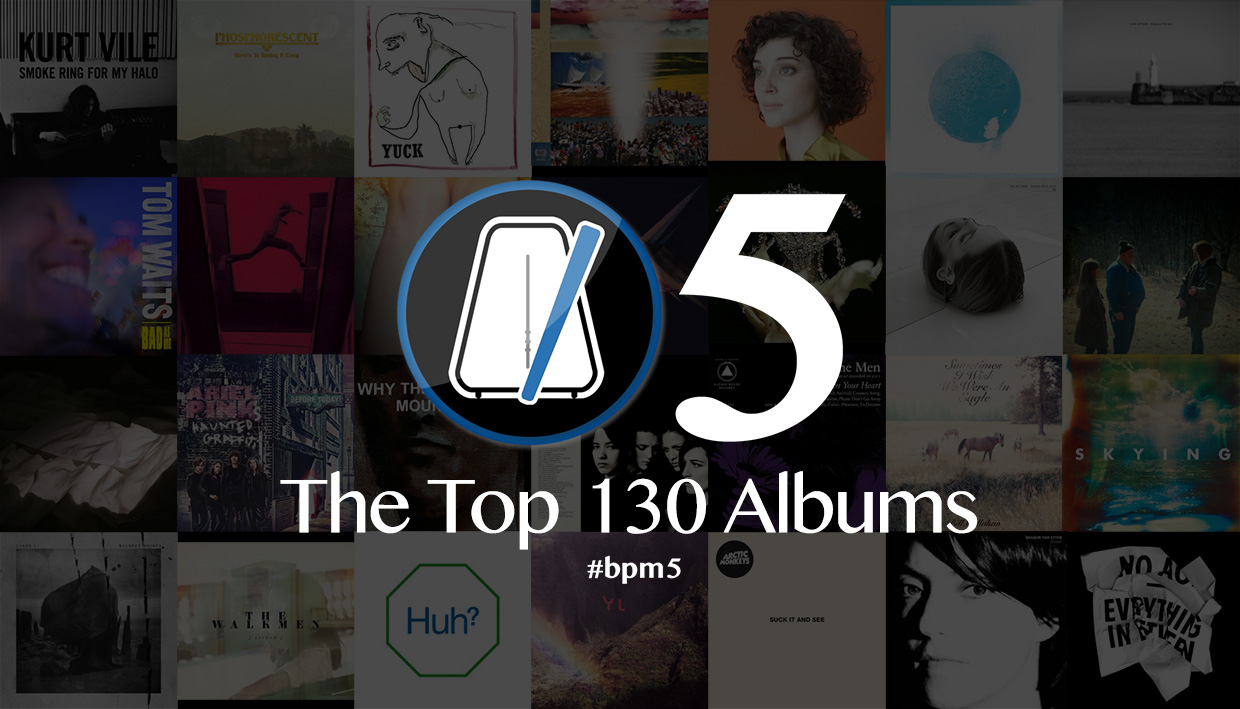
10. The xx – xx
[Young Turks; 2009]
Mopey teenagers dressed in black singing songs about sex. If you read their biography back in 2009, the xx sounded like downers who would make the exact type of bedroom drivel that you’d expect to flow from being horny and lonely. Instead, their debut was a workshop on poise and atmosphere, and provided an extraordinary interpretation of a very simple idea. Romy Madley Croft, Oliver Sim, Jamie Smith and Baria Qureshi culled anything they could and left their compositional abilities out in the cold. But these songs didn’t just survive; they generated their own warmth. “Islands” elegantly coaxes out the isolation that its title implies; “Night Time,” which starts as a moonlight rumination, blossoms into muted dance music; “Heart Skipped A Beat” crests like a wave, generously doling out emotion as it goes. The xx weren’t perfect on their debut, but they were damn close.
– Brendan Frank
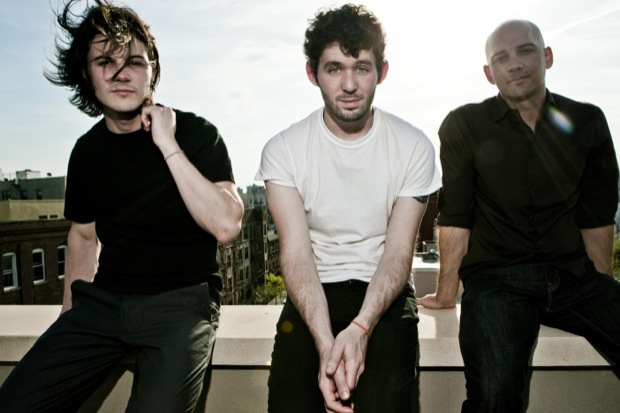
9. The Antlers – Hospice
[Frenchkiss; 2009]
Ever since The Antlers self-released this album back in March 2009 there has been a buzz surrounding it. This buzz came in the form of one person recommending it to another, and then in turn recommending it to someone else. This chain has continued to grow through the re-release on Frenchkiss a handful of months later, and it’s still going now, years later. When you first hear of this album you will hear three things: firstly it’s a concept album, secondly it’s about a doomed relationship wherein the girl has cancer, and finally that the album ends with the girl’s death. This will make you wary on your first listen, but the lush instrumentation and arrangements will get you through. The vocals of Peter Silberman, strained at the tough moments and soft at the tender ones, will bring the story to life and keep you coming back for more. On repeated listens you’ll realise that there is more depth to the story than you at first realised, and perhaps those three things you were told going into it aren’t necessarily true after all. You can take the story as given or you can look at each aspect as a metaphor for something else. This album can be interpreted in infinite different ways, and each of them is as valid as the next. With Hospice The Antlers created the most special sort of album, one that you can relate to even in the most abstract of ways. In the end you can’t help but become emotionally attached to this record, and you too will want to tell your friends about it.
– Rob Hakimian

8. Flying Lotus – Until The Quiet Comes
[Warp; 2012]
Steven Ellison can’t help but think about the possibilities inherent to music – what could be accomplished, or rather, what will be accomplished given enough time. His work as Flying Lotus has always seemed to reside somewhere in the near future, where what we imagine will happen and the actual musical reality meet and discuss terms at some futurist crossroads. But as otherworldly and space-bound as his songs tend to be, there is also a grounded awareness that keeps his music from flitting away into the vacuum of space. He was able to pack in acres of dense instrumentation on his 2010 masterpiece Cosmogramma, but on his latest record, the gorgeous and surprisingly lush Until The Quiet Comes, Ellison backs off a bit and gives his compositions room to breathe.
But if you think he’s gone all soft and doe-eyed, you’re sadly mistaken. So while Until The Quiet Comes does indeed pare back on cramming in the sounds, it’s by no means a stoic affair, nor does it shy away from the kind of experimentation that was so prevalent on his earlier work. It simply finds an easier way to go about dealing with the often tangential musical ideologies that seem to constantly make themselves known over the course of the record. By taking his beat construction proficiency, as well as the ability to make distinct those sounds which would ordinarily cower from the light, he infuses his music with a chrome-plated heart – a thumping rhythmic device that guides and shepherds his music.
Melding aspects of jazz (his great aunt was jazz pianist Alice Coltrane after all), moody electronica, and pointed hip-hop aesthetics, Until The Quiet Comes emerges as the next evolutionary step in Flying Lotus’ sparkling oeuvre. And with guest spots from artists such as Thom Yorke and Erykah Badu, he’ll have plenty of company in these wild musical excursions. So while his earlier works found him making thick, rhythmic narratives – though one could justifiably argue that he does so to a limited degree here – UTQC focuses on the spaces between the notes, the unfurling of atmosphere and disposition. And remember, we’re still in space here so everything is coated in stardust and iridescent melodies and sounds as though it’s been beamed to you through the vast distance between worlds. Ellison’s music may come from Earth but his heart and head are firmly situated somewhere within the dark recesses of the heavens.
– Josh Pickard
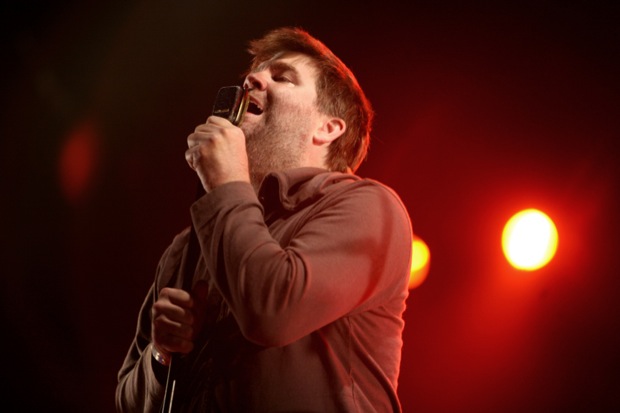
7. LCD Soundsystem – This Is Happening
[DFA / Virgin; 2010]
From the conversations that James Murphy was having in the lead up to his band’s 2010 release This Is Happening it was pretty clear that if the end was not nigh, we were certainly building toward it. But the spirit of the record is not one of a funeral march or of resignation. Nor was the Madison Square Garden concert that closed out the band’s career a moment of mourning. This record, as with everything that led up to the demise of LCD Soundsystem, was a celebration–of “Drunk Girls,” of getting older, of self-analysis, accepting your fate. Dark, perhaps, in its wizened visage but never morose–This Is Happening favored the same sort of bangers they built their name on. “Dance Yrself Clean,” with its cavernous drop, echoes “Daft Punk Is Playing At My House”’s swaggering propulsion. “Pow Pow” is Murphy in verbose mode, doing the closest thing to a 2010 version of “Losing My Edge.” “Home” finds him brooding, self-reflective and sentimental as he was on “All My Friends” and “New York I Love You, But You’re Bringing Me Down.” It was everything that they’d done well over the course of their career, but it wasn’t a victory lap. It was a party.
– Colin Joyce
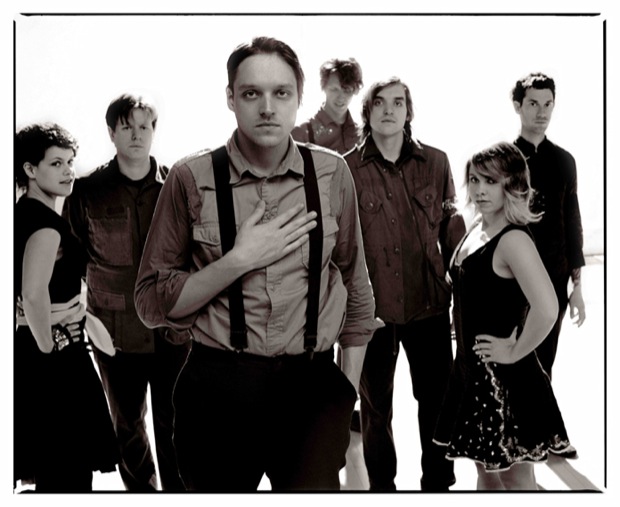
6. Arcade Fire – The Suburbs
[Merge; 2010]
It’s easy to hate Arcade Fire these days. Their strident emotionalism often stands at odds with the witty too-cool irony of the current indie schematic, and to have inspired The Lumineers and other such pale facsimiles into existence on top of that may be to some an unforgivable sin. But even the snipers on the sidelines likely stem from the generation that had its mind collectively blown by Funeral almost a decade ago, and even the slight misstep of the overly dour Neon Bible wasn’t enough to topple this mountain of earnestness and gleeful abandon. Arcade Fire came roaring back into focus with The Suburbs, a striking concept album for even the most apathetic of Generation Y-Care. Though the subject matter of escaping suburban sprawl is as old and hoary as rock music itself (or at least as old as punk), the Butler brothers and friends manage to kick some life into this vaguely dead-horse concept. It’s overwrought, it’s nakedly ambitious, and it’s aw-shucks naive at times, but damned if it isn’t consistently engaging and grade-A catchy. From the “Heart Of Glass” updating of “The Sprawl Pt. II” to the Springsteen-level theatrics of “Half-Light Pt. II,” The Suburbs swings for the bleachers, nailing the grand slam most of the time. Groan and roll your eyes at Arcade Fire and their strident romanticism if you must, but not only are they clearly here to stay, their cultural importance at this moment in time can’t be overlooked or understated.
– Zach Corsa
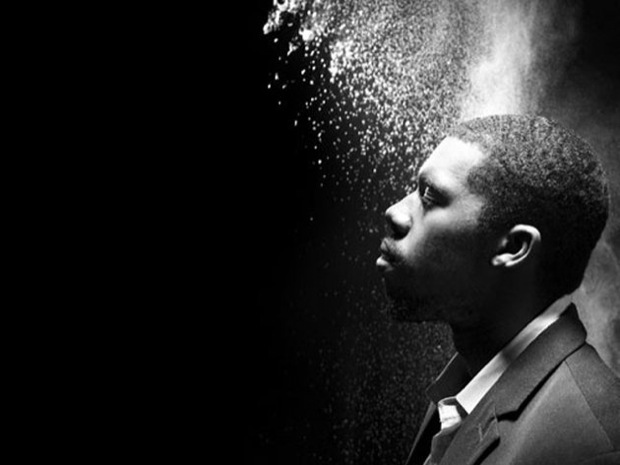
5. Flying Lotus – Cosmogramma
[Warp; 2010]
The dearth of ambition in a mainstream all too happy to slip back into familiar tropes has been turned inside-out on the underground: an anything-goes mentality duly begat a wildly experimental scene where textural emphasis is just as crucial as rhyming meters; where jungle, IDM and industrial are just as likely to be flipped as funk; where beats float, undulate, metamorphose. Flying Lotus stepped up to bat in the spring of 2010 and absolutely knocked it out of the park, gifting us a lasting statement that will live on long after anyone remembers that a time did exist when it was unusual to hear Thom Yorke’s vocals stretched over a jittery beat and a dubbed-out bassline (imagine that!).
Here everyone’s favourite astral traveller went truly intergalactic, bringing back some of the most esoteric, dazzlingly forward-thinking beat music ever to cross over, drenched in soul and jammed with richly emotive melodic squiggles. Despite buzzing with fleet-footed hyperactivity and coiled tightly with broken, warped samples – the usual signifiers that give people credence to slap a “”challenging”” tag on something and leave it – it’s a record people continue to hold dear to their chests, one that refuses to give up all the goods even after countless listens. Completely unspooling the intricate tapestry is a futile exercise. It’s considerably easier to wrap the album around your head space and sink into the deeply immersive smorgasbord of soul food. Initial assumptions that Cosmogramma would prove a gamechanger have been emphatically proved correct. Consider how much poorer we, the music fans, would be had FlyLo remained at mid-level and never fully elevated to his rightful position as a gum-flashing deity. It doesn’t bear thinking about, really. Although with a million microfragments of brilliance zipping past your brain at terminal velocity, you probably wouldn’t have time to anyway.
– Gabriel Szatan

4. Kendrick Lamar – Good Kid, m.A.A.d. city
[Interscope; 2012]
“Everybody sit your bitch ass down and listen to this true mothafuckin’ story told by Kendrick Lamar on Rosecrans…” So starts “The Art of Peer Pressure,” a song detailing a dangerous night out with Kendrick’s crew. It sits as the fourth track on Good Kid, m.A.A.d. city, but the opening lines might as well be the mission statement for rapper Kendrick Lamar’s major label debut. By now, you are familiar with the source material (“Swimming Pools (Drank)” becoming one of rap radio’s most unlikely singles in recent memory) and the rapper’s West Coast street cred, but that aside – this record still packs the capacity to knock you on your ass.
Good Kid… was hailed as an instant-classic upon release in the fall of 2012 and further examination has done little to warrant a change of opinion. Kendrick is a gifted storyteller with the clear-eyed ability to take the listener through the streets of Compton, on a tour of one of the most dangerous and blighted neighborhoods in the United States. The album could serve as a socio-economic case study, where the ways off of trouble Compton streets are either a wicked jump shot or slinging crack rock. No surprise then “I used to be jealous of Arron Afflalo. He was the one to follow,” he raps on bonus track “Black Boy Fly.”
But thankfully, Lamar has some escape skills of his own. He has moves nifty enough to dodge cop cars, rival gangs (like on the unforgettable combo of “Good Kid,” and “M.A.A.D. City”) and drug abuse as he eventually pens his own ticket out before the album’s triumphant conclusion.
The narrative structure of the album not only provides a linear thread for the listener, but also ties back to records from hip-hop’s history. With the rhymes and stories for old-school hip hop heads, and the hooks and clever production to appease today’s listener, Good Kid… is the rare record that is instantly – and rightly – recognized as one of the best, most important artistic offerings in recent rap music history. Indeed, hip-hop fans have been “waiting on Kendrick like the first and the 15th,” and today’s rap game is looking like an easy come-up, ya bish.
– Brian Hodge
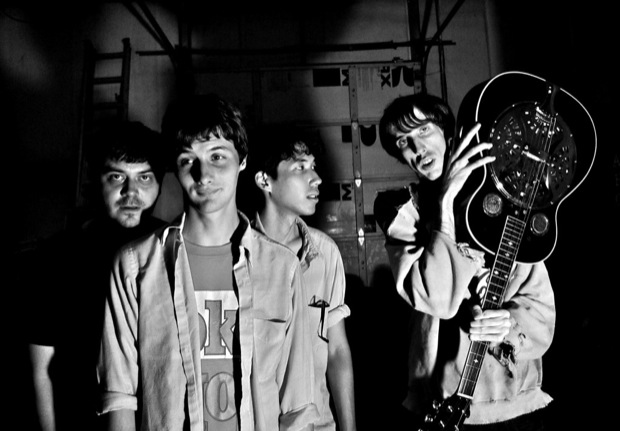
3. Deerhunter – Halcyon Digest
[4AD; 2010]
With their fourth album Halcyon Digest, Deerhunter made their most accessible album to date – and that by no means makes it a straightforward listen. While numbers like “Don’t Cry,” “Memory Boy” and the mid-album tentpole “Desire Lines” express the band’s festival-ready thumping side, complete with sing-along hooks (and “Coronado” has an honest-to-god sax solo in it), there are plenty of other songs that continue Deerhunter’s constant affair with sonic exploration. The opener “Earthquake” is a slow-burner that has washes of guitar that rise gradually like a stormy sea, before cutting back to calmness; “Basement Scene” takes you into a murky lair where singer Bradford Cox’s voice seems to come shivering out of the shadows; and who could forget the euphoric build and release in the deceptively tragic “Helicopter”? Death has always been a constant theme for Deerhunter, and although the sound may seem lighter on Halcyon Digest, there are still ghosts haunting it, such as Dima the Russian sex slave that inspired “Helicopter” or, most notably, Jay Reatard, to whom the seven and a half minute closing track “He Would Have Laughed” is dedicated. With their previous albums Deerhunter had proven to be one of the most sonically creative and rewardingly replayable bands out, and with Halcyon Digest they proved that they could do it with a swagger while sacrificing none of their originality or creativity.
– Rob Hakimian
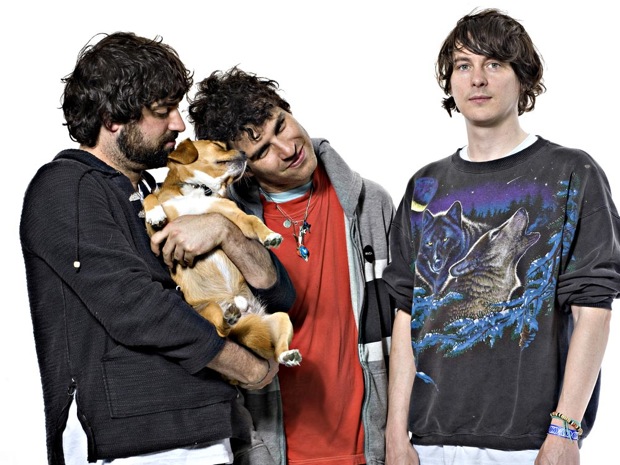
2. Animal Collective – Merriweather Post Pavilion
[Domino; 2009]
For most bands, losing their guitarist would limit their creative potential. But for Animal Collective, Deakin’s temporary leave of absence opened up a world of electronic pop possibilities only hinted at on previous releases. Sure, some of their earlier songs had hooks (“Did You See The Words” and “Grass” on Feels, “Peacebone” on Strawberry Jam) but on Merriweather they’re unprecedentedly straightforward. “Bluish” could’ve been a Bobby Vinton classic on another planet; “Summertime Clothes” and “Brother Sport,” meanwhile, sound like they ought to be piped through the PA system of your local water park. And “Lion in a Coma” could admirably soundtrack a level on Mario Kart, with or without the vocals.
But on an album filled with highlights, it’s the opening one-two punch of “In the Flowers” and “My Girls” that steals the show. Both tracks patiently unfurl towards their respective moments of catharsis, and both are simply impossible to get out of your head. And like this album as a whole, they both reward repeat listening with hidden layers and subtle details—it took me months, for instance, to notice the distant tribal drumming during the second verse of “In the Flowers.” In fact, years later, Merriweather still offers surprises. Just like Mario Kart, its relative simplicity belies giddy layers of depth, and its replay value is nearly infinite.
– Josh Becker
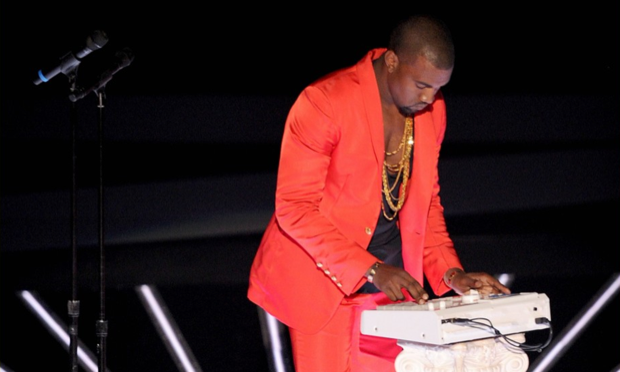
1. Kanye West – My Beautiful Dark Twisted Fantasy
[Roc-A-Fella / Def Jam; 2010]
So here we are. The greatest album of Beats Per Minute’s lifetime. Can’t say I’m surprised, and nor should you be. You saw this coming a mile off, right? Right. If you stand back and take a glance at the past five years, there’s been a decided lack of unifying, big statement music. Hopefully over the past two weeks we’ve proven that there’s been no shortage of varied, innovative, timeless, moving, genre-defying, life-affirming, genuinely brilliant releases across an array of formats and through channels with less barriers of entry than ever before. We’ve showcased 259 of the supporting cast, but that makes up just a fraction of a more amorphous musical landscape than has existed at any point in history. But you couldn’t call much of it truly universal. Not the same way that you could the likes of “Take Me Out,” Funeral, “Hey Ya,” “Paper Planes,” In Rainbows, “Umbrella,” Elephant, “Ignition (Remix)” – all of which dropped in the previous five year stretch. Our victor had three albums on the trot that were immense commercial and critical successes, but came at a time when mainstream media outlets channeled hits in a more conducive fashion. I don’t need to tell you that the structure of music conception and consumption fragmented around the turn of the decade – honestly, Google search Steve Jobs if you don’t believe me!! — but the Information Superhighway only began to irremediably shake things down half a decade back. That My Beautiful Dark Twisted Fantasy managed to bring us all back together at a time when pretty much no-one can do that is impressive enough; that it did so while parading the protagonist nailing a harpy on the cover is worth celebrating. Arise, Yeezus.
Kanye West is without question one of the most compelling characters of our time. In an age where the endless stream of online discourse has neutered the capacity for musicians to get away with being total assholes, Kanye resolutely opposes this egalitarian view on what it means to be a superstar in the 21st century; if you don’t like it, you can fuck right off. Taking Nas’ eternal mantra and running a mile with it, the world is his, and he has no problem dictating proceedings on his own terms. Kanye proudly occupies a junction between Prince and Axl Rose: a gleefully polarising genius, one of the greatest living performers and quite possibly the last true rockstar [nb: I had this down in my notes months before he said the same thing himself.]
That he comfortably nestles shoulder-to-shoulder with the best to ever do it is not down to personality alone; in a similar vein to the globestraddlers of decades gone by, Kanye is acutely aware that unbridled ambition, when properly harnessed, can procure the best results. Zeppelin IV, Bitches Brew, Disintegration, Rumours, Siamese Dream, Sign ☮ The Times, and countless others would not be in the pantheon were it not for bloat, pomp and excess. Dark Fantasy stands amongst them. It is, bluntly, one of the finest works of pop of all time.
OF.
ALL.
THYME.
For those of you scoffing your derisory hog-nosed scoffs, (re-)consider the fundamentals – the very best of the stuff supposedly has the capacity to move you. Well, this is fullbodied mood music, a baker’s dozen that exemplify and embody the purity and potency of recorded sound, and the effect it has on its surroundings. That goes for the anthems right down to the lesser run-out cuts: when “All Of The Lights” comes on in a club, you go that little bit harder. When “Runaway” drops, so too does the collective mood, fingers ritually tapping out the opening notes. The way “Blame Game” utilises panned voice-warping over the sparse Aphex Twin sample is absolutely devastating, inviting sympathy for a man who fucks and chokes his girl right in front of our eyes; the fraction when all pulls away, leaving Kanye’s voice naked, softly asking that “somebody help” is heart-stopping. When “Devil In A New Dress”‘s luxuriating begins to fade, you ease up, before Rick Ross drags a knife across the throat of it with arguably the greatest single verse he has ever, and will ever, commit to tape.
That’s not a unique to Rozay, mind. Kanye got some absolutely incendiary guest spots going, prising the best out of almost every single carefully-picked collaborator: a fallen Pusha dusted himself off and spun gold that shimmers with the finest of his Clipse heyday; a pre-Grammy-winning-headline-status-Bonny-Bear-memebait Justin Vernon layered whiteboy falsetto over a song that was given a music video full of decapitation; the Gil Scott-Heron sample was hoisted out of context and imbued with even greater heft; Nicki’s verse on “Monster” was legendary before the record even hit the stores. I mean did anyone think Fergie, debatably The Worst Living Popstar™, was going to ever make anything above the level of “cunting godawful,” let alone end up on a 24ct album? I can just about swallow the fact that her inclusion here means she might wind up regarded in a positive light a hundred years down the line — just. None of this was “wilful imperfection” – every minute detail was slaved over, and the result is something richer and more creatively dazzling than anyone could have predicted.
Some say Kanye’s a better curator than rapper – his forté is the maximalist brilliance behind the production desk, siring talent young and old, creating bangers for the masses. Fair, he does have a tendency to overextend himself, garbling words and hamfisting metaphors, but I’ll be damned if Kanye doesn’t know how to turn a phrase: “Praise be to the most fly, Prada”? “Put that pussy in the sarcophagus”? Pretty much every single line on the record? Fine, his internal rhyme game might not be on fire, but tell me how many Talib Kweli songs inspire thousands of white people to clutch their heads and scream “our nigga dead” in clubs week in, week out…okay, dubious accolade, that one.
Placed in the wider picture, the timing of Dark Fantasy tells a story within itself. The narrative arc of his career is fascinating, a Grecian tragedy to rival them all. This is the painful snapshot of a king watching his empire crumble around him, bathed in pathos before a rise from the ashes imbues him with more hubris than before. It is every part of Kanye at once: aggressively dominant, emotionally vulnerable, defiantly arrogant, brutally self-conscious, laughably unaware; like a cornered animal frantically cycling through emotions as the walls close in around in, desperate for an escape. The recording process, a $3m Hawaiian excursion that would have outstripped any other tale of doomed failure were the end product not flawless, was micromanaged to the nth degree, belying the intense internal conflict of its creator.
Interestingly, it may have become almost too classic for it’s own good. But imagine listening to it for the first time! Fuck. I wish I had that opportunity again. As with all pivotal moments, I remember exactly where I was when it struck: lying in bed on a drizzly afternoon at my first year of university, intently listening, unencumbered by any distractions (fairly rare nowadays), jaw slackened, eyebrows raised. I had purposefully avoided all GOOD Fridays in the protracted build-up, because I wanted to hear it in full. It’s odd now that I had built such a level of anticipation without even a first taste, but I could sense a storm brewing. We here at BPM rightfully gave it a perfect score, as did an unprecedented amount of critics. It was canonised the second the first leak was downloaded. Scroll back up the page three spots and you’ll see the only viable comparison from recent times – an album against which Kanye’s 2010 masterpiece was used as a parallel benchmark. But whereas good kid, m.A.A.d city broke a star, Dark Fantasy cemented the star.
The man invites opprobrium in every facet of life, and frankly we should be glad he does. Modern music, and culture at large, is better for the wild unpredictability and prodigious talent of Kanye Omari West. Even set against a career that has seen no shortage of highlights, what Yeezy managed in 2010 with My Beautiful Dark Twisted Fantasy was legitimately unique: he channeled all the shit that had subsumed him and minted his most consummate body of work, a landmark that created empathy out of nothing for one of the most reviled people on the face on the earth. Using a tool many claimed to no longer carry the importance of years past, he hoisted himself from the lowest ebb back onto his rightful perch upon the top of Olympus, shifting the global worldview in 68 minutes and 36 seconds. He can do that of course; He Is A God. And didn’t he just let us know that here.
– Gabriel Szatan

